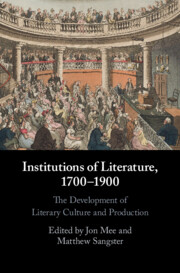Book contents
- Institutions of Literature, 1700–1900
- Institutions of Literature, 1700–1900
- Copyright page
- Contents
- Figures
- Contributors
- Acknowledgements
- Introduction Literature and Institutions
- Chapter 1 Knowledge Exchange in the Seventeenth Century
- Chapter 2 ‘Supporting Mutual Benevolence’
- Chapter 3 Institutions without Addresses
- Chapter 4 Eighteenth-Century Musenhof Courts as Bridges and Brokers for Cultural Networks and Social Reform
- Chapter 5 Becoming Institutional
- Chapter 6 Circulating Libraries as Institutional Creators of Genres
- Chapter 7 Lecturing Networks and Cultural Institutions, 1740–1830
- Chapter 8 Catalogues as Instituting Genres of the Nineteenth-Century Museum
- Chapter 9 Charles Lamb and the British Museum as an Institution of Literature
- Chapter 10 A Disruptive and Dangerous Education and the Wealth of the Nation
- Chapter 11 ‘The Ladies’ Contribution’
- Chapter 12 ‘[L]etters Must Increase’
- Chapter 13 Networks, Nodes, and Beacons
- Chapter 14 The Book as Medium
- Index
Chapter 13 - Networks, Nodes, and Beacons
Cultural Institutions in Nineteenth-Century Southeast Asia
Published online by Cambridge University Press: 30 June 2022
- Institutions of Literature, 1700–1900
- Institutions of Literature, 1700–1900
- Copyright page
- Contents
- Figures
- Contributors
- Acknowledgements
- Introduction Literature and Institutions
- Chapter 1 Knowledge Exchange in the Seventeenth Century
- Chapter 2 ‘Supporting Mutual Benevolence’
- Chapter 3 Institutions without Addresses
- Chapter 4 Eighteenth-Century Musenhof Courts as Bridges and Brokers for Cultural Networks and Social Reform
- Chapter 5 Becoming Institutional
- Chapter 6 Circulating Libraries as Institutional Creators of Genres
- Chapter 7 Lecturing Networks and Cultural Institutions, 1740–1830
- Chapter 8 Catalogues as Instituting Genres of the Nineteenth-Century Museum
- Chapter 9 Charles Lamb and the British Museum as an Institution of Literature
- Chapter 10 A Disruptive and Dangerous Education and the Wealth of the Nation
- Chapter 11 ‘The Ladies’ Contribution’
- Chapter 12 ‘[L]etters Must Increase’
- Chapter 13 Networks, Nodes, and Beacons
- Chapter 14 The Book as Medium
- Index
Summary
Taking as its case study a cluster of schools, libraries, and learned societies in Southeast Asia, this chapter considers the operation of nineteenth-century colonial cultural institutions on multiple scalar and conceptual levels. First, as local, regional, and transnational networks of people, enabling both bonding networks with local and regional institutions and bridging networks with metropolitan institutions. Second, as geographical nodes and/or centres of regional knowledge collection, production, and accumulation that extend and disseminate knowledge gathered in the colonies to metropoles and regional centres via cultural goods such as journals, publication exchanges, and printed works. And third, as perceived beacons attracting European and non-European knowledge producers and consumers within a global system of useful knowledge societies for the diffusion of moral and intellectual improvement. Focusing on the transmission of what Andrew Sartori has called a global ‘culture concept’, the chapter argues that these institutions were critical both to British expansionism in Southeast Asia and to the creation of Chinese and Malay counterpublics that opposed British cultural hegemony.
Keywords
- Type
- Chapter
- Information
- Institutions of Literature, 1700–1900 , pp. 255 - 274Publisher: Cambridge University PressPrint publication year: 2022



